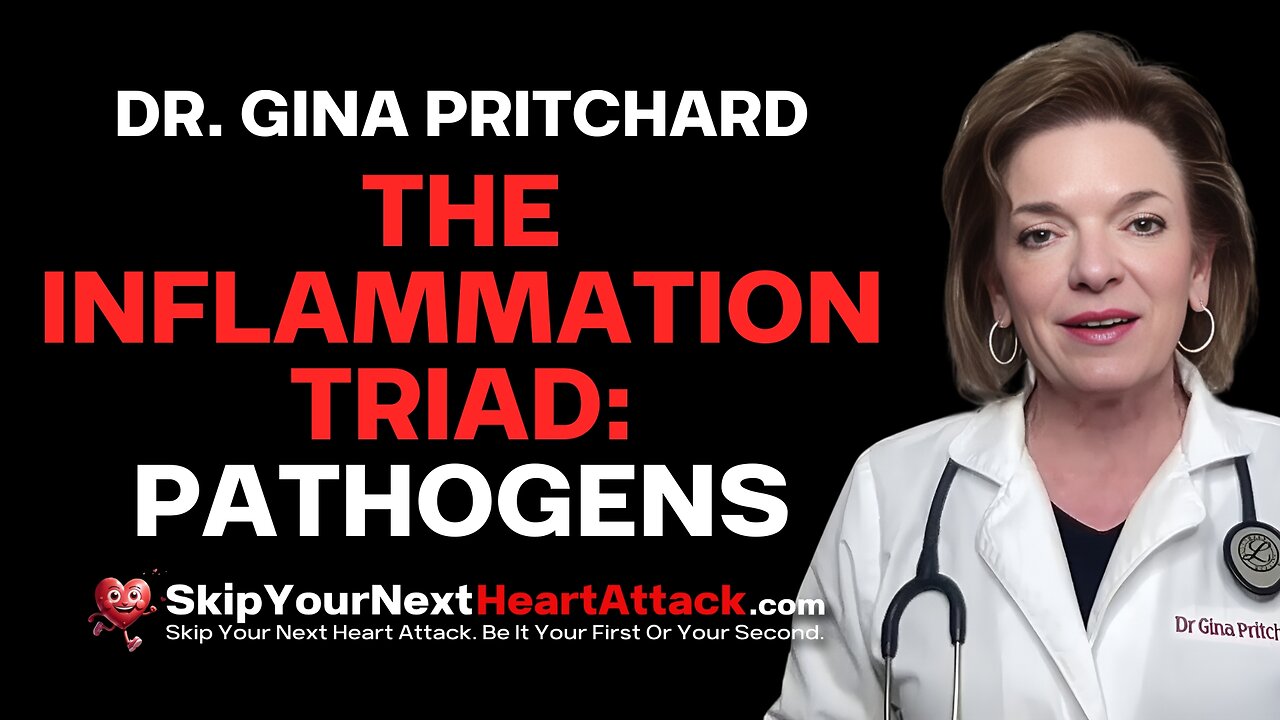Premium Only Content

The Inflammation Triad: The Truth About Pathogens
The Inflammation Triad: Pathogens
0:00 Your Mouth is Putting You At Risk
02:10 Wreaking Havoc Everywhere
03:26 Three Portals of Entry
06:49 Other Things That Contribute to Inflammation
So doctors Bale and Doneen and Vigerust were the first to describe the pathophysiology of this so beautifully. They call this the atherogenic triad. These 5 high risk or dangerous bacteria have a direct, deadly impact on the artery wall, on that plaque. These bacterial pathogens and their endotoxins call in the LDL cholesterol and increase the concentration of this dense, sticky, dangerous type of cholesterol at the site of the artery wall where plaque is.
Toxins have to get through that lining in the artery wall to get into the intima-media space. The inflammation that occurs there just opens up this endothelial lining and makes it much more permeable or leaky for the bacteria, the toxins, the lipids, the debris to get into the artery wall, create a lesion, become a vulnerable plaque, and then it increases the stickiness. It's more difficult for your body to clear it. That's at least three ways we know of that these bacterial pathogens have a direct causal relationship with heart attack and stroke.
Another study describes 5 ways oral bacterial pathogens get into the wall of the artery and into the arterial lining everywhere. They get into the brain and lead to not only vascular related dementia, but other dementia types. Into every organ in the body because it's really wreaking havoc at the cellular level.
This all goes back to years ago when the American Heart Association said, "There's so much evidence we cannot ignore the fact that at least 50% of heart attacks are triggered by oral pathogens." We have good data to support this. We just need to get the message out there not only is it validated, we're practicing on evidence based protocols, but that there is a way to treat it. There is a bright light at the end of the tunnel. We can all live free of heart attack and stroke.
Let’s look at the three portals of entry coming from the mouth. The first one is vascularity. Bleeding gums is what a lot of people associate epithelial lining and they're crossing over into the bloodstream. There is a direct penetration of the esophagus. As you're swallowing, it can penetrate through that. Thirdly, we are swallowing. That is when these bacteria are swallowed and make their way into our GI tract. They are absorbed through the lining and into the bloodstream.
Many of them in the GI tract cross this lining that is meant to protect us. They contribute to this dysbiosis, or this lack of health in the microbiome in the GI tract. Normally, we have a mucosal layer. One layer of protection. Then we have this one cell layer thick, of the epithelial cells with these villi. All of these things are designed to move all of the toxins, the big particles like bacterial pathogens that reside in the mouth or any kind of toxins. These pathogens are supposed to go on downstream in the GI tract and be eliminated, not make their way into the bloodstream.
But because they cause damage to the tract and because many other things we do in our lifestyle contributes to damage to the mucosal layer, the epithelial cells and these villi, it looks more like the right side of the slide where the cells aren't nice and tight together. There's wide open junctions and an inability for these gatekeeper cells to keep the toxins out.
When it's working beautifully, only the nutrients get through. But most of us don't have a beautiful GI tract and epithelial lining. Toxins are getting through. These bacterial pathogens are just 1 example of that. When they get in through the GI tract and directly into the vascular system, then that's where they can cause trouble. In the vascular wall, in the heart, in the brain, in the kidneys.
There are other things that contribute to inflammation. Even as these bacteria alone weren't disruptive to the GI tract, food sensitivities, allergies, autoimmunity. Stress plays a role. And then the other thing I'd like to say is when we're not oxygenating well, then our mechanisms of eradicating toxins from our body. are impaired. We need plenty of good healthy oxygen going straight to the lungs so when the blood supply that takes the oxygenated blood to every organ in our body, the GI tract, the liver, the pancreas, the heart, the brain is well oxygenated.
If we've got an impairment there, again, airway to pathogens to plaque, we're trying to connect the dots between all 3 of these that are truly the worlds that connect us in dental and non dental medical communities. And then the 3 concepts that we need to know in order to be able to save our own life and our patients' lives.
For more information, visit https://skipyournextheartattack.com
-
 3:25:11
3:25:11
Akademiks
4 hours agoPRE SUPERBOWL STREAM! Will Kendrick END Drake Career Tonight? Will Drake and PND outsell DOT?
59.8K6 -
 LIVE
LIVE
Vigilant News Network
5 hours agoEfforts to BAN Dangerous COVID Jabs Underway | Media Blackout
1,705 watching -
 1:49:02
1:49:02
VIVA TV
3 days agoWhat Is The Most Shocking Sports Story Of The 2000's? (The Bracket, Vol. 161)
81.8K13 -
 3:07:41
3:07:41
TheNateVibez
6 hours ago#1 Streamer in Kentucky👀 - T-800 Road to Rank Domination✌ - ArmyVet🫡
50.3K1 -
 4:03:05
4:03:05
EXPBLESS
6 hours agoHAPPY FORTNITE SUB SUNDAY - SUB GOAL {8-50} #RUMBLEGAMING
38K2 -
 9:19
9:19
VSiNLive
1 day agoYou MUST Consider These 3-LEG PARLAYS for Super Bowl LIX!
33.3K -

Scottish Viking Gaming
9 hours ago💚Rumble :|: Sunday Funday :|: If you can't Beat them...EAT THEM!!
47.7K2 -
 1:46:47
1:46:47
Game On!
1 day ago $13.41 earnedExpert Super Bowl LIX Picks, Preview, and Best Bets!
142K16 -
 36:50
36:50
Mrgunsngear
1 day ago $25.85 earnedPresident Trump's Executive Order To The ATF: This Could Be Huge!
113K72 -
 25:48
25:48
Adam Does Movies
1 day ago $3.84 earnedTop 10 Reasons Why Emilia Pérez Is Complete TRASH!
72.6K7